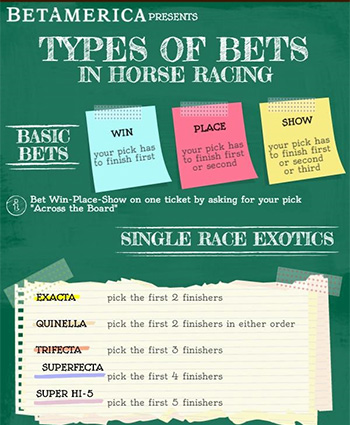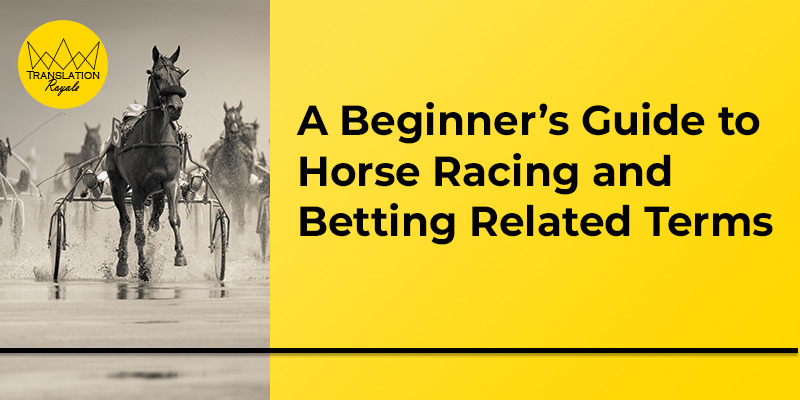Horse gambling terms

Equine terms · Colt – a male horse under the age of four · Filly – a female horse under the age of four horse gambling terms Foal – a horse of either sex less than one year old. In hand: Running under moderate control, at less than best pace. In the money: Finishing first, second or third. Jolly - Betting term for the horse with the shortest odds (the favourite). Lady Godiva – Betting slang for £5. Monkey – Betting slang for £ Nap – The best. Across the Board - Wagering on a horse to win, place, and show. If your horse finishes 1st, you win all three bets. If your horse finishes 2nd, you win on the.
Help: Glossary of Horse Racing Terms
What does horses say? The sound that a horse makes is called a neigh. A happy neigh of a horse is a greeting to other horses. A horse's neigh is also known as a whinny or a bray.
How do you say horse bet? Here's the usual method of stating your bet: Give the AMOUNT of the wager ($2 minimum), the TYPE of bet, and the NUMBER or numbers of your selections. For example- $3 to win on number 5; $6 to show on number 7; $4 exacta, 3-2.
What does a horse say in words? Neighing or Whinnying: This is the most common sound associated with horses. It's often described as a high-pitched, prolonged sound. The onomatopoeic representation could be "neigh" or "whinny."
What is a good horse quote? A horse doesn't care how much you know until he knows how much you care. Put your hand on your horse and your heart in your hand. I'd rather ride on a Mustang, than in one. No heaven can heaven be, if my horse isn't there to welcome me.
What is the quote about money and horses? Don't give your son money. As far as you can afford it, give him horses. No one ever came to grief, except honourable grief, through riding horses. No hour of life is lost that is spent in the saddle.
Horse Racing Terminology: A Beginner's Guide to Common Racing and Betting Terms
Most common trade name is Lasix. Also, to ride a horse at that gait. GATE- Starting mechanism. GET- Progeny of sire. This is racetrack jargon that would be expressed more clearly by saying that the horse overstepped or overreached and cut himself; reserve grabbed a quarater for direct quotes. Also, graduate of the claiming ranks-a horse, that has moved up to allowance, stakes or handicap racing.
GRAY- A mixture of white and black hairs. Used in handling horses around the stable and when not being ridden. HAND- Four inches. Unit used in measuring height of horses from withers to ground. Also, to handicap a race, to make selections on the basis of the past performances.
Also one who makes selections based on past performances. Also one who makes selctions based on past performances. HEAD- A margin between horses. One horse leading another by the length of his head. Specifically, an entire male 5 years old or older. HUNG- Horse tiring, but holding position.
A jumping race over lower fences than steeplechase races. Horse gambling terms Also, a sign flashed by officials on tote board on such occasions. JOG- Slow, easy gait. Also a horse or pony who accompanies a starter to post. Also a jockey having a mount. Also to strengthen a horse's legs through exercise. Also distance between horses in a race. LOCK- Slang for a "sure thing" winner.
LUG in or out - Action of a tiring horse, bearing in or out. Also applied to non-winning rider. MARE- Female horse 5 years old or older. Also, female of any age who has been bred.  MASH- Moist mixture, hot or cold, of grain and other feed given to horses. MINUS POOL- A mutuel pool caused when one horse is so heavily played that, after deductions of state tax and commission, there is not enough money left to pay the legally prescribed minimum on each winning bet.
MASH- Moist mixture, hot or cold, of grain and other feed given to horses. MINUS POOL- A mutuel pool caused when one horse is so heavily played that, after deductions of state tax and commission, there is not enough money left to pay the legally prescribed minimum on each winning bet.
The racing association usually makes up the difference. Also a guard placed over a horse's mouth to prevent him from biting or eating. NECK- Unit of measurement, about the length of a horse's neck; a quarter of a length. Illegal in most jurisdictions. NOD- Lowering of head.
Winning in that manner. NOSE- Smallest advantage a horse can win by. In England called a short head. If lodged by official, it is called an inquiry. In England it is simply called "on," thus a horse " on" is actually at odds of Also racing official. PILL- Small numbered ball drawn to decide post positions. Also a farrier. Racing plates. Running in a position with horses in front and alongside.
POLE- Markers at measured distances around the track, marking the distance from the finish. The quarter pole, for instance, is a quarter of a mile from the finish, not from the start. POST- Starting point or position in starting gate. POOL- Mutuel pool. Total sum bet on a race or even, such as the win pool, daily double pool, exacta pool.
PROP- Refusing to break with field from gate. Standing flat-footed. Also, when a horse suddenly stops running a full speed by extending his forefeet as "brakes. R RABBIT- A horse that is considered to have little chance of winning a race but is entered purely to ensure a fat pace and tire out the other front-runners, softening up the competition for the benefit of an entrymate.
In jumping races, balking at the jump. Also, held off the pace. ROAN- Mixture of white and red or brown hairs. ROMP- Running or winning with utmost ease. In steeplechasing, more particularly to teach a horse to jump. SET- A group of horses working together. Also, put to a drive, or asked to run by a jockey.
A row of barns. Best sports bars in downtown la SHOW- Third position at the finish. Unable to improve position. SIRE- Father of a horse. Wet on surface with firm bottom. SLOW- Footing that is not fast, between good and heavy. SNUG- Mild restraining hold by rider. The fees can be for nominating, maintaining eligibility, entering and starting, to which the track adds more money to make up the total purse.
Some stakes races are by invitation and require no payment or fee. STAR- Small patch of white hair on a horse's forehead. Also a credit a horse receives from being forced out of an overcrowded race, giving him priority in future races. Also distance covered after each foot has touched the ground once. A wager in which the first two finishers in a race, in exact order of finish, must be picked.
A wager in which all possible combinations using a given number of horses are bet on. The total number of combinations can be calculated according to the formula x2-x, where x equals the amount of horses in the box. For example, boxing four horses would actually be 12 combinations To arrive at the cost of the wager, multiply the total combinations by the cost of the individual wager.
Any wager other than win, place or show. For the mathematically inclined, the amount of combinations in any exotic wager can be figured by the formula n. Horse that is a race favorite despite being outclassed by other competition in the field. See underlay. Two or more starters running as a single betting unit entry , when there are more starters in a race than positions on the totalizator board.
Betting: 1 Race for which the track handicapper assigns the weights to be carried. Harness racing: A race in which performance, sex or distance allowance is made. Post positions for a handicap may be assigned by the racing secretary. Post positions in a handicap claiming race may be determined by claiming price. Horse gambling terms A mutuel pool caused when a horse is so heavily played that, after deductions of state tax and commission, there is not enough money left to pay the legally prescribed minimum on each winning bet.
The racing association usually makes up the difference. Probable odds on each horse in a race, as determined by a mathematical formula used by the track handicapper, who tries to gauge both the ability of the horse and the likely final odds as determined by the bettors. Wagering at legalized betting outlets usually run by the tracks, management companies specializing in parimutuel wagering, or, in New York State, by independent corporations chartered by the state.
Wagers at OTB sites are usually commingled with on-track betting pools. A form of wagering originated in by Frenchman Pierre Oller in which all money bet is divided up among those who have winning tickets, after taxes, takeout and other deductions are made.
Using a key horse or horses in different, but not all possible, exotic wagering combinations. See wheel. A type of multi-race wager in which the winners of all the included races must be selected. A handicapping tool assigning a numerical value to each race run by a horse to enable different horses running at different racetracks to be objectively compared.
See Beyer number. An automated parimutuel system that dispenses and records betting tickets, calculates and displays odds and payoffs and provides the mechanism for cashing winning tickets. The usually electronic totalizator display in the infield which reflects up-to-the-minute odds. It may also show the amounts wagered in each mutuel pool as well as information such as jockey and equipment changes, etc.
A racing surface that favors a particular running style or position. For example, a track bias can favor either front-runners or closers or horses running on the inside or outside. Condition of the racetrack surface. See fast; good; muddy; sloppy; frozen; hard; firm; soft; yielding; heavy. A wager picking the first three finishers in exact order.
A trifecta wager in which all possible combinations using a given number of horses are bet upon. The sum of the formula is then multiplied by the amount wagered on each combination. Betting all possible combinations in an exotic wager using at least one horse as the key.